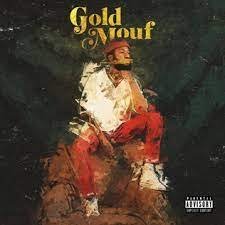Lute Evolves and Matures with New Album "Gold Mouf"
Luther “Lute” Nicholson signed to Dreamville Records in December of 2015, and has since solidified a name for himself within the well-known record label pioneered by hip-hop icon J. Cole. He joined alongside Ari Lennox, one of several fellow Dreamville artists, including Cozz, J.I.D. and Saba, who are featured on his newest project. Lute’s Dreamville debut arrived with the label’s second compilation album Revenge of the Dreamers II; more recently, he was featured on the label’s hit record “Under The Sun,” in which he coined his self-proclaimed alter-ego “Gold Mouf.” His sophomore album of the same title centers around themes of honesty, patience and balance.
In the opening track, Lute keeps it “100” as he underscores the importance of humility and self-awareness, refusing to get discouraged by envying others more successful than him and wisely realizing that he is moving at his own pace. He decides to adopt a resilient perspective which views failure as an opportunity to reflect and adapt, rather than taking it as an attack against his self-worth, and values the quality of his craft far more than his record sales or streaming numbers. The purity of his art matters more to him than obtaining money or clout, allowing him to take his time when creating. His patient mindset encourages anyone with self-limiting beliefs to stay committed. This theme is reinforced on “Overnight” as Lute assures us that his growth and success has taken years to cultivate.
On “GED (Gettin Every Dolla),” Lute reveals that he is “tired of being underlooked” due to prioritizing healing himself and sharing that process through his music over mainstream popularity. Instead of feeding his own resentment, Lute decides to use his distress as fuel for his own motivation as he raps:
“I put the tears in my verse, so I get the shit I deserve // We came from nothing at all, if we have a problem, we solve // Figure that shit out ourself, turn all my pain into wealth // Turn all my pain into wealth.”
Rather than holding grudges for not getting what he thought he deserved, Lute transforms his pain into insightful lyrics, which grants him self-reflection and opportunities for personal improvement. His humble beginnings taught him to be independent of others and take initiative himself. Lute realizes that people who “[throw] shade out of fear” are secretly bitter and insecure, while those who are secure do not waste their time putting others down.
Unlike many rap artists, Lute does not shy away from vulnerability, though he simultaneously resists developing a victim mentality. In the track “Eye to Eye,” Lute and his label-mate Cozz get refreshingly honest about their mental health struggles and open up about their unhealthy coping behaviors. Lute explains how his anxiety creates distance in his relationships and confesses to numbing his pain with alcohol. Not only does he admit to his own flaws, Lute uniquely promotes healthier habits like meditation and hydration. He publicly takes accountability through his music and uses his platform to inspire real change in his listeners. Acknowledging the impermanence of material possessions and superficial relationships, Lute does not need to look externally for pleasurable distractions to feel complete; he does not try to maintain a false persona, choosing instead to share glimpses of his mental health difficulties. Having learned to remain grounded amid the emotional highs and lows of life, Lute recognizes the utility of minding his own business and staying focused on his ambitions.
In an interview with Paul Rosenberg, Lute cited Wu Tang Clan’s Ol’ Dirty Bastard as his biggest hip-hop inspiration, praising the unfiltered nature of ODB’s lyrical output and admiring his willingness to expose his flaws through his music. Although the powerful lyricism throughout this album primarily serves as advice to his daughter and his peers, it can definitely be applied to any listener. Lute’s guidance seems to be told from a place of direct experience, intended to inspire others to follow their passions as he is doing. Gold Mouf proves that Lute is both evolving as an artist and maturing as an individual.

